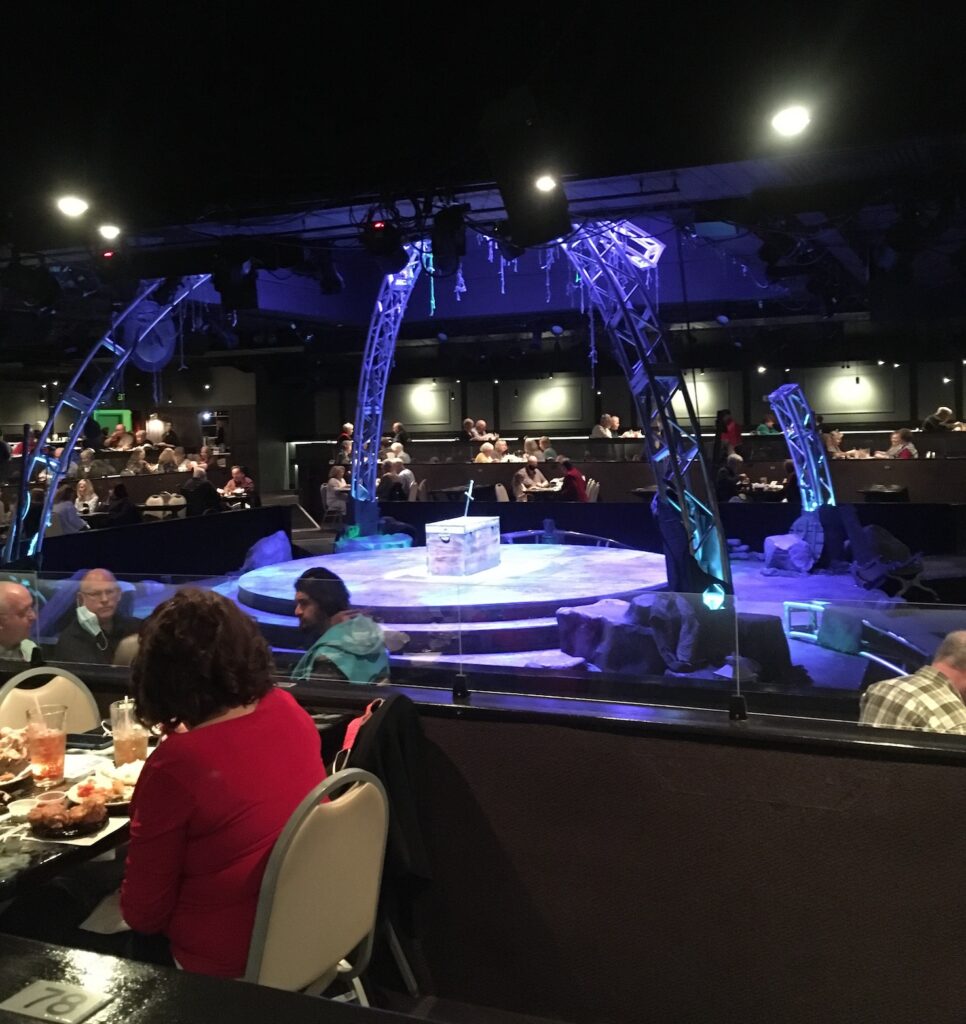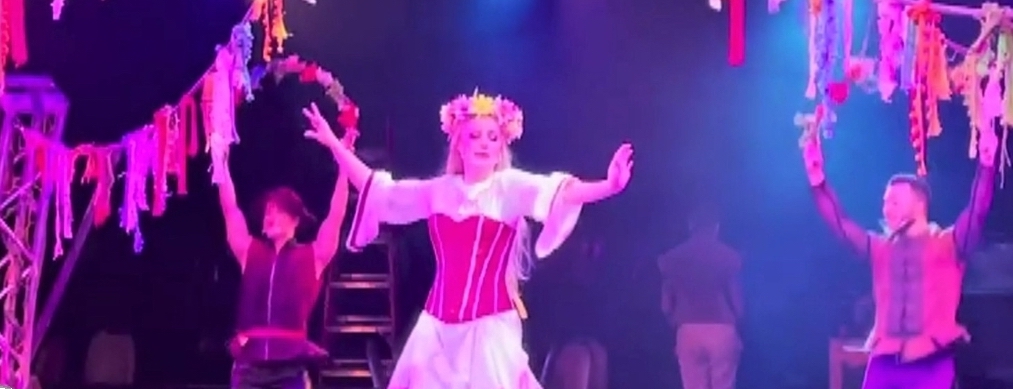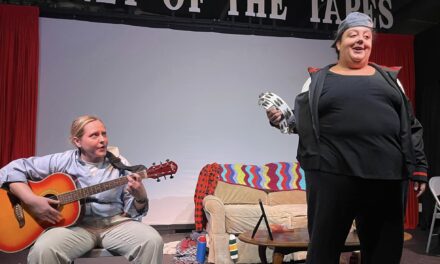Harli Cooper as Guenevere. Photo: DDP
Camelot
Book and lyrics by Alan Jay Lerner, Music by Frederick Loewe
Based on the King Arthur legend as adapted from T.H. White’s novel The Once and Future King.
Book adapted by David Lee
Directed by Lee Buckholz
A review by Keith Waits
Entire contents are copyright © 2021 by Keith Waits. All rights reserved.
Camelot. You know the disappointing movie version with Richard Harris, or perhaps you saw one of his national tours, or when Rock Hudson toured it – it was a favorite of aging movie stars at a low point in their careers, but you have to be of a certain age to remember those, and is anyone still around who can claim to have witnessed the original King Arthur, Richard Burton, whose snidely arrogant Welsh dialect gave the fanciful legend a much-needed grounding and acerbic edge? This is one of the most legendary shows ever to hit Broadway.
Its legend fed the even larger mythology of John F. Kennedy and his progressive Presidency, filled with the vitality of youth and the easy glamour of First Lady Jackie.
So forgive me if I cannot help but watch Camelot now with nostalgia for leadership defined by moral principle, even if we, long ago learned of the deep personal compromises of JFK, and a winsome recognition that those scandals seem positively quaint in the 21st Century. But Arthur’s mission to end violence and war and institute a fair and equitable justice system resonates, and his pacifistic idealism cannot be ignored.
But this also a love story between Arthur and Guenevere, and of the tragic triangle with Lancelot du Lac. Even the noblest model is subject to human frailty and corruption.
Alan Jay Lerner and Frederick Loewe were at the peak of their powers, and this show comes a few years after the tremendous success of My Fair Lady and the score is almost as strong as that classic. The development of the production leading up to Broadway was very troubled, which may account for why it suffers in comparison.
Lee Buckholz’s staging is lean and stark. The pared-down cast may be due to COVID, but he makes a virtue of it with sets (by Ron Riall) and costumes (by Sharon Murray Harrah) that are more contemporary than the fairy tale trappings usually employed, a darker, sexier mix of medieval barbarism and modern industrial aesthetic. Derby Dinner’s in-the-round space is spanned by two intersecting metal girder arches that lend an oppressive air to the proceedings, even if both Arthur and Mordred climbed all over them.
The physiques of the athletic cast are optimized with mesh, spandex, and some very cool boots so that there is some heat justifying the smoke, and the flavor of the costumes is most distinctly utilized when the sexual frolic of “The Lusty Month of May” becomes a gentle parody of masculine and feminine tropes, immediately followed by the emphatic macho posturing of “Take Me to the Fair.” With the aid of Heather Paige Folsom’s spirited choreography, it proves Mr. Buckholz knows how to turn a sly trick while satisfying the traditional demands of a show like this.
Blake Graham shows Arthur maturing into wisdom, struggling to fulfill his high-minded ideals. He reminds us that Arthur is a young king, even though the role is often played by much older actors. It’s a good performance. Harli Cooper is a delightful Guenevere, and dare I say it, her singing at times reminded me of Julie Andrews on the original cast album.
As Lancelot, Corwyn Hodge finds self-righteousness, physical presence, and fun while cutting the necessary romantic profile to tempt Guenevere. The late introduction of the evil Mordred, Arthur’s illegitimate son is arguably a mistake, and Adam Racque takes such delectable pleasure in playing the villain that we cannot help but see the flaw in not giving the character more time on stage.
Three stalwart actors, Zach Perrin, Dick Baker, and Paul McElroy, must carry the weight of what is intended to be a fuller chorus of Knights of the Round Table, and they carry it off with style, humor, and energetic braggadocio. The tight ensemble is filled out nicely by Henry Miller, Brittany Carricato Cox, Rachel Elizabeth, and Josiah Richardson, who also plays Tom, the boy dispatched by Arthur to carry the memory of Camelot into the future.
Even reconceived, Camelot remains a powerful show, and this production doesn’t let us down. Much of that impact comes from the enigmatic and mysterious Arthurian mythology, which has always and will forever remain irresistible. Lerner and Loewe’s story is but a stripped-down sketch of all that Thomas Mallory and T.H. White captured in their masterworks, yet it is enough to fire up our imaginations and at least suggest the depths of the material.

Derby Dinner Playhouse is the one theatre in the Metro area that has been open, albeit at 50% capacity, with tables distanced at least six feet apart, the food served plated and covered instead of the traditional buffet, and servers wearing masks and gloves. The doors are open earlier than 6:00 pm to help avoid lines forming and the lobby features six-foot spacing markers frequently.
Even the cast sported clear plastic face masks, which meant that Guenevere could not kiss either of the men in her life. The addition was not as distracting as I would have expected, and the actors, as always, use nearly invisible microphones. Personally, I felt the risk was effectively contained as long as everyone took care and followed the rules for removing their masks only to eat and drink.
But in the pre-show, when The Footnotes reminded the audience that, in accordance with the Indiana Governor’s mandate, masks should be worn for the remainder of the evening, one of the three women seated at the next table turned to her friends and exclaimed, “screw that.” They only donned their masks when they rose to leave the table. You know who you are, table 79, and I’m glad I was seated so far from you.
Camelot
February 17 – March 28, 2021
Derby Dinner Playhouse
525 Marriott Drive
Clarksville, Indiana 47129
derbydinner.com
Keith Waits is a native of Louisville who works at Louisville Visual Art during the days, including being the host of LVA’s Artebella On The Radio on WXOX 97.1 FM / ARTxFM.com, but spends most of his evenings indulging his taste for theatre, music and visual arts. His work has appeared in LEO Weekly, Pure Uncut Candy, TheatreLouisville, and Louisville Mojo. He is now Managing Editor for Arts-Louisville.com.





